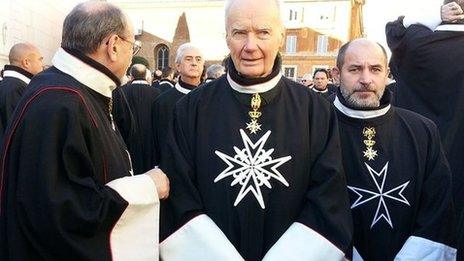The ancient Knights of Malta in modern world
- Published

Four thousand Knights of Malta, heirs to one of the great orders of European chivalry of mediaeval times, and the fourth oldest religious order in the Roman Catholic Church, took over the Vatican briefly on Saturday.
Members of the Sovereign Military Order of Malta from more than 100 countries marched five abreast into Saint Peter's Basilica on a cold winter's day under a cloudless sky, squinting in the bright sunlight.
The knights were hatless, but wore long black woollen cloaks with the distinctive eight-pointed white cross of their order embroidered in front.
The dames (about 30% of the members are now women), wearing similar robes and coiffed with black mantillas, followed behind.
The procession, including aid workers and volunteers bringing up the rear, took more than half an hour to wind around the basilica, into the square and up the steps into Saint Peter's.
At the high altar Pope Benedict's number two, Cardinal Tarcisio Bertone, led a special Mass to celebrate the 900th anniversary of the founding of the order by Brother Gerard, a Benedictine monk who opened a hospital for sick and poor pilgrims in Jerusalem at the time of the Crusades.
In 1113 Pope Paschal II formally recognised the independence of the Knights with a Papal bull, the original of which is still held in Malta's National Archives.
The Knights have had a long history of displacement around the Mediterranean.
After being evicted from Jerusalem by Saladin towards the end of the 12th Century, they set up a new headquarters in Cyprus, and subsequently on the island of Rhodes where they created an independent state.
During the Middle Ages they were more warriors than hospitallers. For two centuries they were the masters of Malta but they were again evicted, this time by Napoleon who occupied the island on his way to Egypt.
They finally settled in Rome in 1834, where they continue to enjoy many of the privileges of statehood, such as the power to appoint and receive ambassadors, print stamps, and issue passports, without actually having a real state to govern.
Observer status
Today the Knights are a unique sovereign entity in that they rule over no territory except a palace in one of Rome's smartest shopping districts, a church and an elegant villa overlooking the city.
They have observer status at the United Nations, just like the Vatican, and Pope Benedict is a member of the monastic order, having joined 15 years ago.
He gave his blessing to the knights at the end of the Vatican Mass urging them to continue their work for the world's neediest people.
He reminded them that they are not practising "mere philanthropy" but must always stay true to the order's original Christian ideals, and to Church teaching.
The order's international headquarters is in a palace situated in Rome's Via Condotti, a short distance from the Spanish Steps. High fashion boutiques nearby offer neat handbags for sale at prices ranging up to $3,000.
The atmosphere inside reminded me of an Oxbridge College or a London Club. Inside the porter's lodge there are cubby holes for letters addressed to His Highness, the Grand Master - who is British - and to senior officials.
Attracting talent
Matthew Festing is an expert on 17th Century European painting. He used to run the Northern England office of the auction house Sotheby's before being elected for life five years ago to become the leader of the Knights of Malta.
He now enjoys the title of prince, and holds the equivalent rank of a Cardinal of the Roman Catholic Church.
Sitting in his cosy private apartment decorated with gold brocade wall coverings, fine antique furniture and paintings, he explained to me how the Knights are changing.
"The fact that we are called Knights is a function of the past really," he said. "We were originally recruited from the aristocratic families of Europe."
The order has now become a worldwide organisation, and it tries to attract the most talented people from many areas outside Europe.
"We have a very different makeup from what we did perhaps 50 years or 500 years ago, but fundamentally the talents we are trying to attract for our members are the same," Mr Festing said.
- Published9 February 2013